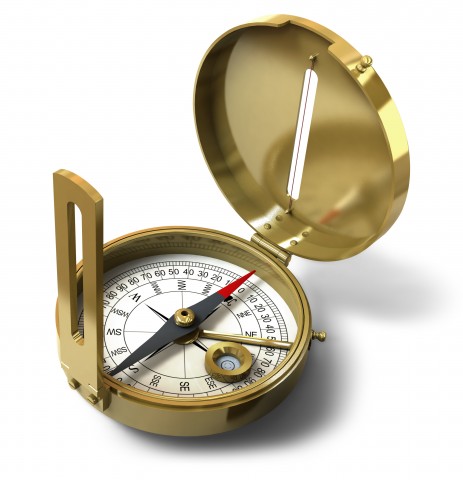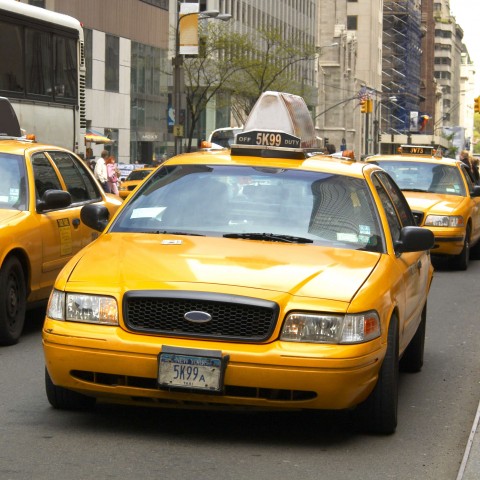
When you’re taking a cab, asking for the nearest toilet, and making sure that the bus goes where you need it to go, being able to understand directions in Russian is essential for tourist survival in Russia.
Of course, you can always use translation apps, but sometimes it’s just inconvenient to do that. The taximeter is counting ruble by ruble, a full bladder doesn’t want to lose a second more, and the bus is already at the bus stop ready to take off—and you have no idea when the next one is.
Learning all about directions in Russian will help you save time, money, and nerves. Also, knowing how to say basic things—such as the cardinal directions in Russian, the words for “far” and “close,” “straight,” “left” and “right” in Russian, etc.—is essential in improving your Russian language skills.
So, let’s get a smooth journey prepared right now and learn about directions in Russian! A complete guide to directions in Russian is waiting for you.

Table of Contents
- On the Map
- On the Road: Right and Left in Russian & More
- Talking about Landmarks
- Asking for Directions in Russian: Must-know Phrases
- How to Give Directions in Russian: Must-know Phrases
- Conclusion
1. On the Map

The words for compass directions in Russian are really useful when it comes to navigation. Let’s learn them.
1- “East” in Russian Language
Восток (vostok) is “east” in Russian. You can also make it an adjective: восточный (vostochnyy) meaning “eastern.”
Usage in a sentence or phrase:
- Восточные страны (vostochnyye strany) — “eastern countries”; “oriental countries”
- Озеро находится к востоку от города (Ozero nakhoditsya k vostoku ot goroda) — “The lake is to the east of the city.”
- Владивосток находится в восточной части России (Vladivostok nakhoditsya v vostochnoy chasti Rossii) — “Vladivostok is in the eastern part of Russia.”
2- “West” in Russian Language
Запад (zapad) is “west” in Russian. As an adjective, it will be западный (zapadnyy) meaning “western.”
Usage in a sentence or phrase:
- Западные страны (zapadnyye strany) — “western countries”
- Россия западнее Китая (Rossiya zapadneye Kitaya) — “Russia is to the west of China.”
- Санкт-Петербург западнее Москвы (Sankt-Peterburg zapadneye Moskvy) — “Saint Petersburg is to the west of Moscow.”
3- “South” in Russian Language
Юг (yug) is “south” in Russian. As an adjective, it will be южный (yuzhnyy) meaning “southern.”
In Russian, юг (yug) has one more meaning. When someone is going on vacation to the warm seaside, he says Я поеду на юга (Ya poyedu na yuga), meaning “I will go to the south.” That’s a classic Russian vacation—lying on the beach and swimming in the sea. Yeah, during the whole week or even two. Having a nice and even suntan on the whole body is really valued by Russians, as it shows off that they had a vacation (read: had enough money to have a vacation!). :)
Usage in a sentence or phrase:
- Юг России (Yug Rossii) — “the south of Russia”
- Сочи находится на юге России (Sochi nakhoditsya na yuge Rossii) — “Sochi is in the southern part of Russia.”
4- “North” in Russian Language
Север (sever) is “north” in the Russian language. You can also make it an adjective: северный (severnyy) meaning “northern.”
Usage in a sentence or phrase:
- Северная столица (severnaya stolitsa) — “northern capital” (referring to the famous Russian city of Saint-Petersburg)
- Деревня находится к северу от нас (Derevnya nakhoditsya k severu ot nas) — “The village is to the north of us.”
- Мы идем на север (My idyom na sever) — “We are going to the north.”
5- Southeast, Southwest, Northeast & Northwest in Russian
All compound directions start with either “north” or “south,” like in English. Starting them with “east” or “west” is a mistake and will confuse native speakers.
To make a compound direction, add the letter “o” and a hyphen to север (sever) or юг (yug):
- Юго-запад (yugo-zapad) — “southwest”
- Юго-восток (yugo-vostok) — “southeast”
- Северо-запад (severo-zapad) — “northwest”
- Северо-восток (severo-vostok) — “northeast”
2. On the Road: Right and Left in Russian & More

Okay, say you need to tell your cab driver where to stop. Let’s equip you with the most useful phrases for giving directions in Russian: “left” and “right” in Russian, front and back, far and close, “straight,” and more.
1- “Right” in Russian Language
There are several ways to say “right” in the Russian language depending on the context. If you wanna say that something is located “to the right,” then you need to use the word справа (sprava):
- Справа от меня – рынок. (Sprava ot menya – rynok) — “There is an open market to the right of me (to my right).”
- Банк находится справа. (Bank nakhoditsya sprava) — “The bank is located to the right.”
If you’re turning to the right or going to the right, then you need to use the word направо (napravo):
- На первом перекрестке поверните направо. (Na pervom perekryostke povernite napravo) — “On the first crossroads, turn to the right.”
- Туалет направо (Tualet napravo) — “The toilet is to the right.”
So, just keep in mind that “right” can be expressed in two ways. Make sure that you pick the right one for the context.
2- How to Say “Left” in Russian
Just like “right,” “left” in the Russian language can be said differently depending on the context. To say that something is located “to the left,” use слева (sleva):
- Что ты видишь слева от себя? (Chto ty vidish’ sleva ot sebya?) — “What do you see to the left of you (to your left)?” This is a very useful phrase to use if you’re talking on the phone with your Russian friend who’s gotten lost.
- Магазин находится слева от парикмахерской. (Magazin nakhoditsya sleva ot parikmakhersoy) — “The shop is to the left of the hairdresser’s.”
If you’re turning or moving to the left, then use the word налево (nalevo):
- За светофором поверните налево (Za svetoforom povernite nalevo) — “Turn to the left after the traffic light.”
- Идите по коридору налево (Idite po koridoru nalevo) — “Go to the left in this corridor.”
Now you know how to say “right” and “left” in Russian.
3- Useful Words and Phrases in a Taxi or Car

In addition to knowing how to say “left” and “right” in Russian, you need to know how to say other basic “taxi” words. Here are some words you’ll probably need when giving directions in Russian to your taxi driver:
- Такси (taksi) — “taxi”
- Я вызову такси (Ya vyzovu taksi) — “I’ll call a taxi.”
- Переднее сиденье (peredneye siden’ye) — “front seat”
- Я сяду на переднее сиденье. (Ya syadu na peredneye siden’ye) — “I’ll sit in the front seat.”
- Заднее сиденье (zadneye siden’ye) — “back seat”
- Я сяду на заднее сиденье (Ya syadu na zadneye siden’ye) — “I’ll sit in the back seat.”
- Спереди (speredi) — “in the front”
- Садитесь спереди. (Sadites’ speredi) — “Take a seat in the front.”
- Сзади (szadi) — “in the back”
- Садитесь сзади (Sadites’ szadi) — “Take a seat in the back.”
- Далеко (daleko) — “far”
- Далеко ехать? (Daleko yekhat’?) — “Is it far to ride from here?”
- Близко (blizko) — “close”
- Магазин уже близко (Magazin uzhe blizko) — “The shop is already close.”
- Рядом (ryadom) —”next to”
- Мой дом рядом с торговым центром (Moy dom ryadom s torgovym tsentrom) — “My house is next to the shopping mall.”
And here’s a list of useful road landmarks and how to ask a taxi driver to stop the car right after them:
- Перекрёсток (perekryostok) — “crossroads”
- Остановите, пожалуйста, за перекрёстком. (Ostanovite, pozhaluysta, za perekryostkom) — “Please, stop right after the crossroads.”
- Светофор (svetofor) — “traffic light”
- Остановите, пожалуйста, за светофором (Ostanovite, pozhaluysta, za svetoforom) — “Please, stop right after the traffic light.”
- Пешеходный переход (peshekhodnyy perekhod) — “crosswalk”
- Остановите, пожалуйста, за пешеходным переходом (Ostanovite, pozhaluysta, za peshekhodnym perekhodom) — “Please, stop right after the crosswalk.”
Here are the most simple and useful phrases for how to give directions in Russian when you’re in the taxi:
- Остановитесь, пожалуйста. (Ostanovites’, pozhaluysta) — “Stop, please.”
- Тут (tut) — “Here”
- Use this word if the car is going slowly and the driver is waiting for your signal to stop.
- Езжайте, езжайте. (Ezzhayte, ezzhayte) — “Keep going.”
- Побыстрее, пожалуйста. (Pobystreye, pozhaluysta) — “Faster, please. Hurry up, please.”
- Помедленнее, пожалуйста. (Pomedlenneye, pozhaluysta) — “Not so fast, please.”
Here are advanced sentence patterns for you:
- До реки ехать десять километров. (Do reki yekhat’ desyat’ kilometrov) — “It’s a 10-kilometer drive to the river.”
- Я живу через улицу от вкусной и уютной кофейни. (Ya zhivu cherez ulitsu ot vkusnoy i uyutnoy kofeyni) — “I live across the street from a tasty and cozy coffeeshop.”
- Остановите за углом, пожалуйста (Ostanovite za uglom, pozhaluysta) — “Stop around the corner, please.”
If taxi phrases are essential for you, listen to our audio lesson on riding a taxi and watch our video lesson for absolute beginners on taking a cab.
3. Talking about Landmarks

When learning about Russian directions, you can’t skip the essential location nouns. Here’s a list of them:
- Аэропорт (aeroport) — “airport”
- Мне нужно в аэропорт Шереметьево (Mne nuzhno v aeroport Sheremet’yevo) — “I need to get to the Sheremetyevo Airport.”
- Станция метро (stantsiya metro) — “metro station”
- Это какая станция метро? (Eto kakaya stantsiya metro?) — “What metro station is this?”
- Центр города (tsentr goroda) — “city center”
- Завтра я хочу погулять в центре города (Zavtra ya khochu pogulyat’ v tsentre goroda) — “Tomorrow I wanna walk in the city center.”
- Парк (park) — “park”
- Давай погуляем в парке! (Davay pogulyayem v parke!) — “Let’s have a walk in the park!”
- Отель (otel’) — “hotel”
- There is another word for a hotel: гостиница (gostinitsa). They mean the exact same thing.
- Вы не знаете, где гостиница “Космос”? (Vy ne znaete, gde gostinitsa “Kosmos”?) — “Do you know where the hotel ‘Kosmos’ is?”
- Больница (bol’nitsa) — “hospital”
- Отвезите меня в ближайшую больницу! (Otvezite menya v blizhayshuyu bol’nitsu!) — “Take me to the nearest hospital!”
- We hope that you won’t need to go to the hospital, but if you do, here’s our audio lesson on explaining symptoms while in a hospital.
- Банк (bank) — “bank”
- Подскажите, где ближайший банк? (Podskazhite, gde blizhayshiy bank) — “Please, tell me where the nearest bank is.”
- Магазин (magazin) — “shop”
- Магазин одежды (magazin odezhdy) — “clothes shop”
- Продуктовый магазин (produktovyy magazin) — “food shop”
- Супермаркет (supermarket) — “supermarket”
- Вы не подскажете, где ближайший супермаркет? (Vy ne podskazhete, gde blizhayshiy supermarket?) — “Could you tell me, please, where the nearest supermarket is?”
- Торговый центр (torgovyy tsentr) — “shopping mall”
- Торговый центр находится прямо у выхода из метро. (Torgovyy tsentr nakhoditsya pryamo u vykhoda iz metro) — “The shopping mall is right near the exit from the underground.”
- Кафе (kafe) — “cafe”
- Давай сходим в кафе (Davay skhodim v kafe) — “Let’s go to the cafe.”
- Ресторан (restoran) — “restaurant”
- Это хороший ресторан (Eto khoroshiy restoran) — “This is a good restaurant.”
- Столовая (stolovaya) — “canteen”; “cafeteria”
- Food here is usually less tasty, but cheaper.
- Кофейня (kofeynya) — “coffee shop”
- Это моя любимая кофейня (Eto moya lyubimaya kofeynya) — “This is my favorite coffee shop.”
- Аптека (apteka) — “pharmacy”
- Вы не знаете, где аптека? (Vy ne znayete, gde apteka?) — “Do you know where the pharmacy is?”
You can also check out our video lesson to learn more transportation vocabulary.
Once you enter any building, you’ll need the following words:
- Туалет (tualet) — “restroom”
- Вы не подскажете, где туалет? (Vy ne podskazhete, gde tualet?) — “Could you tell me where the restroom is?”
- Извините, вы не знаете, где ближайший туалет? (Izvinite, vy ne znayete, gde blizhayshiy tualet?) — “Excuse me, do you know where the nearest toilet is?”
- Лифт (lift) — “elevator”
- Лифт по коридору налево (Lift po koridoru nalevo) — “The elevator is in the corridor to the left.”
- Лестница (lestnitsa) — “stairs”
- Поднимитесь по лестнице на второй этаж. (Podnimites’ po lestnitse na vtoroy etazh) — “Climb the stairs to the second floor.”
- Ворота (vorota) — “gates”
- Ворота открываются. (Vorota otkryvayutsya) — “The gates are opening.”
- Парковка (parkovka) — “parking lot”
- Извините, а где парковка? (Izvinite, a gde parkovka?) — “Excuse me, where is a parking lot?”
4. Asking for Directions in Russian: Must-know Phrases

- Извините… (Izvinite…) — “Excuse me…”
- Разрешите спросить… (Razreshite sprosit’…) — “May I ask…”
- Где находится…? (Gde nakhoditsya…?) — “Where’s…?”
- Где находится ближайший туалет? (Gde nakhoditsya blizhayshiy tualet?) — “Where is the nearest toilet?”
- It’s okay to use the word находится (nakhoditsya), but sometimes Russians just omit it: Где туалет? (Gde tualet?) — “Where is the toilet?”
- Как добраться до…? (Kak dobrat’sya do…?) — “How can I get to…?”
- Как добраться до метро? (Kak dobrat’sya do metro?) — “How can I get to the metro station?”
- Keep in mind that this phrase means that it will be a long way to get there. If the metro station is somewhere nearby, it’s better to ask: Где метро? (Gde metro?) — “Where is a metro?”
- The Russian Saint Petersburg Metro and the Moscow Metro are very famous tourist attractions—make sure you visit. And don’t miss a chance to practice your Russian vocabulary. :)
- Сколько ехать до…? (Skol’ko yekhat’ do…?) — “How long will it take to drive to…?”
- Сколько ехать до аэропорта Домодедово? (Skol’ko yekhat’ do aeroporta Domodedovo?) — “How long will it take to drive to Domodedovo Airport?”
- … далеко отсюда? (…daleko otsyuda?) — “Is … far from here?”
- Автобусная остановка далеко отсюда? (Avtobusnaya ostanovka daleko otsyuda?) — “Is a bus stop far from here?”
- Спасибо за помощь (Spasibo za pomoshch’) — “Thank you for your help.”
5. How to Give Directions in Russian: Must-know Phrases

- Идите… (Idite…) — “Go…” or “Walk…” if the person is walking.
- Идите в комнату (Idite v komnatu) — “Go to the room.”
- Езжайте… (Ezzhayte) — “Go…” or “Drive…” if the person is using a vehicle.
- Езжайте вперед (Ezzhayte vperyod) — “Go straight.”
- Идите прямо (Idite pryamo) — “Go straight.”
- Идите вперед (Idite vperyod) — “Go straight ahead.”
- Идите в обратную сторону (Idite v obratnuyu storonu) — “Go in the opposite direction.”
- Поверните направо (Povernite napravo) — “Turn right.”
- Поверните налево (Povernite nalevo) — “Turn left.”
- На … этаже (Na … etazhe) — “On … floor.”
- На третьем этаже (Na tret’yem etazhe) — “On the third floor.”
- Поднимитесь по лестнице вверх (Podnimites’ po lestnitse vverkh) — “Go upstairs.”
- Спуститесь по лестнице вниз (Spustites’ po lestnitse vniz) — “Go downstairs.”
- Вы его не пропустите (Vy ego ne propustite) — “You won’t miss it.”
6. Conclusion
Now, you have everything you need for a comfortable journey in Russia: how to say “right” and “left” in Russian, how to give and ask for directions in Russian, and so on.
To remember these words and phrases better, make word cards in a word card learning app such as Quizlet; you can also sign up for a free account on RussianPod101 and use our flashcard feature. Make sure to go through these words multiple times, so that they stick in your memory.
Also, use our directions word list to practice your listening and pronunciation skills.
Learning about Russian directions might be tricky, especially figuring out the grammar, so if you feel like you need some help, consider taking RussianPod101’s MyTeacher program for Russian-learners. Native Russian teachers with impressive teaching backgrounds will help you understand the grammar, memorize the words, and use them in real dialogue. Just take a trial lesson to give it a try. ;-)
Before you go, let us know in the comments how confident you feel asking and giving directions in Russian. Very confident, or are there still some things you’re having trouble with? We look forward to hearing from you!










